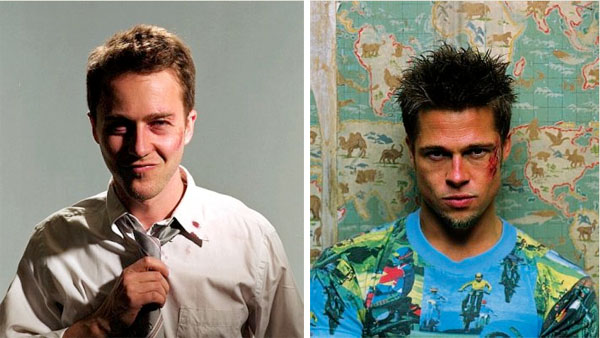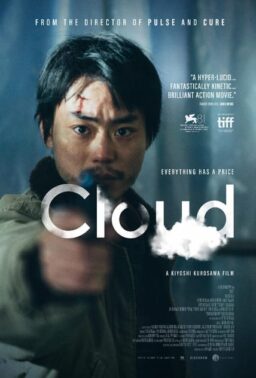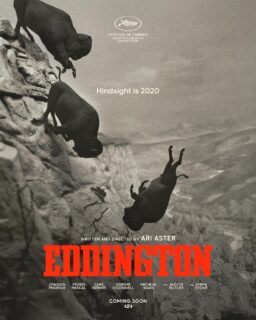Tyler Durden: Brad Pitt
Narrator: Edward Norton
Marla Singer: Helena Bonham Carter
Robert Paulsen: Meat Loaf Aday
Angel Face: Jared Leto
Directed by David Fincher. Written by Jim Uhls. Based on the novel by Chuck Palahniuk. Photographed by Jeff Cronenweth. Running time: 139 minutes. Rated R (for extreme violence, sex).
Jim Emerson’s further exploration of the movie, “I Am Jack’s Manic-Depression” can be found here.
“A fascist rhapsody!” — David Denby, The New Yorker
Ooof!
“Morally repugnant! Socially irresponsible!” — Anita M. Busch, The Hollywood Reporter
Ugh!
“Deeply misogynistic!” — Susan Stark, The Detroit News
Awfff!
“Macho porn!” — Roger Ebert, The Chicago Sun-Times
Ouch!
Don’t expect to see any of the above quotes in movie ads for “Fight Club” (although, come to think of it, if Fox did decide to use ’em, it would certainly be in keeping with the gleefully subversive, anti-consumerist spirit of this major studio movie). “Fight Club,” a brutally funny and provocative satire directed by David Fincher (“Seven“), may have scored a late-round box office victory in its first weekend, but it also received a vicious pummeling from a number of (mostly mainstream) critics. While some reviewers praised the film as “an apocalyptic comedy of rage” (Jay Carr, Boston Globe) and “an uncompromising American classic” (Peter Travers, Rolling Stone), those who felt less enthusiastic about the picture didn’t just dislike it — they loathed it, reviled it, demonized it.
A number of these critical low-blows and wild punches, however, were almost as irresponsible and off-target as the writers accused the movie of being. Hollywood Reporter editor Anita M. Busch was so outraged that she suffered premonition fits: “‘Fight Club’ will, no doubt, become Washington’s poster child for what’s wrong with Hollywood. And Washington, for once, will be right. The film is exactly the kind of product that lawmakers should target for being socially irresponsible in a nation that has deteriorated to the point of Columbine.” (Them’s fightin’ words, and in response to the Reporter’s ranting, 20th Century Fox pulled all advertising from the trade paper indefinitely. Which didn’t last long.)
In the aftermath of the Columbine High School massacre, some writers were genuinely concerned that the movie might inspire copycat beatings or bombings. Roger Ebert, in the Chicago Sun-Times, acknowledged that the film has “levels of irony and commentary above and below the action,” but he worried: “[W]hatever Fincher thinks the message is, that’s not what most audience members will get.” Wrote Ebert: “I think it’s the numbing effect of movies like this that cause people to go a little crazy.”
Meanwhile, both Busch and the Los Angeles Times’ Kenneth Turan were aghast that the movie’s stylized, flash-frame nudity and relentlessly barbaric fight scenes had not earned it an NC-17 rating from the MPAA. They have a point — and, of course, if certain major newspapers would agree to accept advertising for NC-17-rated movies, and if certain major theater chains would agree to show them, and if certain major video store chains would agree to stock them … then Hollywood might actually be allowed to create and exhibit movies made by and for adults that are rated for adults only. Indeed, the way that corporations such as these exert repressive, paternalistic control over so many parts of our lives — and the barely contained rage that builds up inside people as a consequence — is one of the themes of “Fight Club.”
Oddly, a few of the critics who excoriated “Fight Club” actually applauded the mindless thrill-ride violence of “Natural Born Killers” a few years back. What’s easier to understand is how some of them found the trite and smug “satire” of the recent “American Beauty” so much more appealing (“Oh, look — that suburban American family lives in a red, white, and blue house with a white picket fence! How scathingly witty and insightful!”). At any rate, it’s been a while — since “Crash,” or even “Natural Born Killers” — that a movie has so profoundly disturbed and polarized people who see movies for a living. (I’ve seen it twice, by the way, and I’m pleased to report that audiences themselves seem to “get it” just fine. I’ve witnessed plenty of cathartic laughter, but no cheering of the movie’s mayhem, the way bloodthirsty audiences audibly rooted for the exuberantly wacky purveyors of carnage in “NBK” — mainly because the thought-provoking, authority-questioning “Fight Club” doesn’t encourage knee-jerk crowd responses the way the pandering “NBK” so shamelessly did.)
But, wait, let’s back up a little bit and see what this fracas is really about by actually examining what “Fight Club” does and how it works. (WARNING: If you haven’t seen “Fight Club” and don’t want to go in with preconceptions, you might want to delay reading further until you’ve seen the movie for yourself.) I suppose it’s best to begin at the beginning, and “Fight Club” begins (and stays) deep inside the brain of its nameless, hilariously unreliable Narrator (Edward Norton), a nearly somnambulistic insomniac who twists, rewinds, flashes forward, and otherwise manipulates every frame of the story. Everything that happens in the movie happens inside his consciousness — or unconscious or subconscious.
You can debate all you want about what’s “real” and what’s “fantasy” in a movie like this (or “Eyes Wide Shut,” or “The Wizard of Oz“) but that doesn’t really get you anywhere. All that matters is that what’s on the screen reflects what’s going on inside the protagonist’s head. (I mean, you may as well waste time pondering whether Dorothy really goes to Oz and meets a Scarecrow, a Tin Man, and a Cowardly Lion who teach her about her own intelligence, compassion, and courage … or whether it’s all “just” a dream. Who cares?)
It’s been said that all good movies tell you how to watch them, but you do have to pay attention — something a few of “Fight Club”‘s critics failed to do. “Fight Club” continually reminds viewers that they’re watching one man’s illustrated interior monologue; all the characters are seen as projections of his own psyche — his desires, his fears, his frustrations. The film also continually tinkers with the properties of the medium to emphasize the sheer movie-ness of what’s on the screen. (This must surely be the first movie to point out the projectionist’s changeover marks on the print.)
Keeping all this in mind (heh-heh), the “Sixth Sense”-like shift in awareness that happens in the third act of “Fight Club” shouldn’t come as that much of a surprise to the audience; it’s the Narrator who finds himself waking up into a nightmare of his own making. “Fight Club” is a lot of things all at once — a grim fairy tale for adults, a consumerist revenge fantasy, a portrait of a disintegrating personality, and, for all its hyper-active stylization, an astonishingly vivid portrait of the berserk materialist wasteland in which (like it or not) billions of city dwellers live today.
“Was I asleep? Had I slept? Was Tyler my bad dream or was I Tyler’s? I was living in a state of perpetual deja vu.” — the Narrator
The Narrator doesn’t have a name, but let’s call him “Jack” (as the script does), after his penchant for ironically identifying himself with various parts of the physical and psychological anatomy (“I am Jack’s medulla oblongata,” “I am Jack’s inflamed sense of rejection”). Jack is a white-collar urban drone who is so alienated from everyone around him — and, most of all, from himself — that he views his life as if it were “a copy of a copy of a copy.” If he were in therapy, his shrink would say he’s having an “existential crisis” and diagnose him as clinically depressed. Over the course of the movie, Jack falls (apart) from depression into manic depression into paranoid schizophrenia. Even when he thinks he’s getting better, he’s getting worse. The big question is, how far will he sink before he hits bottom?
Like Kevin Spacey’s narrator/protagonist in “American Beauty,” Jack is figuratively and/or literally dead (and it doesn’t much matter which). His soul is numb and empty and, in a kind of compulsive re-enactment of ancient hunter-gatherer instinct, he keeps trying to fill it with retail goods. But he’s never satisfied. “What kind of dining set defines me as a person?” he finds himself wondering. Jack tells himself that he’s acquired a good couch, a decent stereo system, and a nice wardrobe; that he’s just on the verge of feeling “complete.” But, instead, he’s suffocating under the weight of his purchases. He imagines himself a prisoner of his IKEA catalog. Shopping becomes his only outlet for self-expression, sexual or otherwise, in a society ruled by the cult of consumerism. To anyone who’s ever felt possessed by his/her possessions, this is painfully familiar — and funny — stuff.
Pathetic, tormented Jack discovers that the only way he can find any peace (or get any sleep) is to attend support groups for people with terminal conditions. Being that close to death and hopelessness somehow soothes him and makes him feel, perversely, more alive. And, besides, when people think you’re dying they tend to actually notice that you exist. “Fight Club” explores modern modes of addiction — to consumerism, to 12-step programs, to ritualized “extreme sports” risk-taking — as Jack goes from being an IKEA addict, to a support-group addict, to a fight club addict. (The “Fight Club” itself could be an offshoot of a bungee-jumping fraternity.) Turan accuses the movie of “playing like the delusional rantings of testosterone-addicted thugs” — which is exactly the point, though he misses the movie’s irony. Unlike Turan, “Fight Club” and its Narrator do not unquestioningly accept these characters’ patently grandiose delusions at face value.
When (upon abruptly awakening from a self-destructive wish-fulfillment nightmare that his plane is exploding in mid-air) Jack meets Tyler Durden (Brad Pitt), he’s encountering nothing less than his own Id, his alter-ego, his doppelganger. Tyler (decked out in garish red duds to suggest danger, excitement, bloodlust, and a complete lack of anything resembling taste) is a volatile dude — cocky, confident, spontaneous, irrational, irrepressible, infantile, aggressive, anti-social, hedonistic, uncontrollable. Jack is fascinated by him, drawn to him, and also scared of him. Like any (in-)decent Id, Tyler is prone to crude, impulsive, and reckless behavior: He splices frames from porno movies into family films, pees in the soup at his restaurant job; he is a mess of raging appetites who likes to drink, fight, screw, and blow up things. But for all that, Jack sees Tyler as his breakthrough, a way out of his rut, the voice that will finally tell him: “You are not your f***ing khakis!”
In one of the film’s most inspired metaphors (and there are lots of ’em), Tyler is also the consummate soap salesman, the personification of untamed capitalism. You see, Tyler’s special deluxe soap is made from the fat of liposuction patients. The by-products of these people’s own gluttony and vanity (their fat) are sold back to them as a luxury cleansing item. (Taking the metaphor one step further, Tyler later uses the soap, combined with other common household ingredients, to make bombs that rock the foundations of the very capitalist enterprises his soap business would otherwise appear to epitomize.)
Anyone familiar with the history and methodology of advertising will notice a few salient themes emerging here. Advertising is most often not about selling you a product, it’s about selling you an image of your own identity, and about creating an identification with a product, which leads to the addictive phenomenon known as “brand loyalty.” And some of the most successful early advertising campaigns (in the late 1800s) were for soap products that sold themselves as solutions to an advertiser-defined “problem” (whether it was “germs” or “b.o.” or, later, “ring around the collar”). First you package and sell the problem, then you package and sell the solution to the problem.
And that’s pretty much what Tyler and Jack do with their invention, Fight Club — they articulate the impotent rage and disillusionment felt by so many wage slaves today, give it a name and a structure and a set of rules, and sell it back to them as a means for achieving cathartic release and feelings of empowerment. The idea is patently absurd, but on some level it makes sense — not unlike David Cronenberg’s collision of sex and car wrecks in “Crash (1997).” These guys have to beat the life back into themselves. Fight Club is not about “winning” or beating up somebody else; it’s a form of manual electro-shock therapy, a way of jolting themselves out of their numbness and reconnecting with reality. The metaphor is so clearly a psychological one that to say “Fight Club” is about fist-fighting is like saying “Taxi Driver” is about cab driving.
What begins as Tyler and Jack’s exclusive basement ritual soon spreads and becomes a very successful corporate franchise (I kept expecting an IPO), a messianic cult — and a fascist, terrorist paramilitary organization that its co-founder is powerless to stop. Jack’s life suddenly turns into “Frankenstein” Meets “Life of Brian” as he desperately attempts to tame his own creation-run-amok. But no matter what he says or does, his followers doggedly continue with their apocalyptic plan, blindly hailing him as a genius every step of the way. The critics who accuse “Fight Club” of promoting fascism and terrorism don’t seem to notice that Jack is appalled by the monster he has helped to bring into the world, and that has now gone out of control — which is what happens when you let the Id run wild. On one level, “Fight Club” can be seen as the story of a guy who wakes up one day and discovers to his profound horror that that he is Jim Jones, David Koresh, Ted Kazinski, and Timothy McVeigh all rolled into one.
Tyler takes capitalism, and then anti-capitalism, to the illogical extreme of fascism and terrorism, but that doesn’t make the movie a “fascist tract.” In the final third of the film the devotees of Fight Club (now re-christened Project Mayhem) turn into mindless, “Invasion of the Body Snatchers” pod people and Jack turns into Kevin McCarthy, hysterically trying to warn everybody that the sky is falling. I was reminded, too, of the ravenous undead zombies in George Romero’s “Dawn of the Dead,” who instinctively flock to the shopping mall because “it was once an important place in their lives.”
“Fight Club”‘s jabs at consumerism seem to have particularly upset certain critics, because the movie doesn’t typecast its corporate villains. “Why pick on IKEA?” wonders David Denby. It would have been easy to get an audience to hate ruthless, faceless, monolithic monsters of greed like IBM or Microsoft. Everybody hates them already. But “Fight Club” targets a more insidious kind of corporate enterprise — the kind that markets itself as your best friend and uses cutesy branding images to get under your skin and into your wallet: IKEA, Volkswagen, Apple, Starbuck’s. If you don’t get some sort of vicarious thrill from seeing one of those insufferably precious (and overpriced) new VW bugs receive a facial with a sledgehammer, or from watching that smug Apple logo blown to bits (how’s that for “Think Different”?) … well, as they say, check your pulse.











